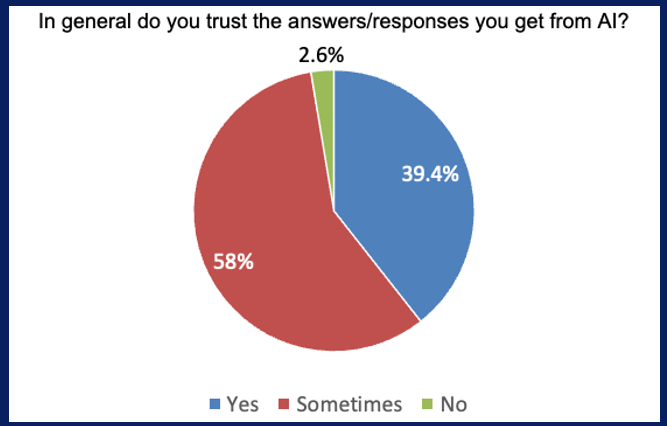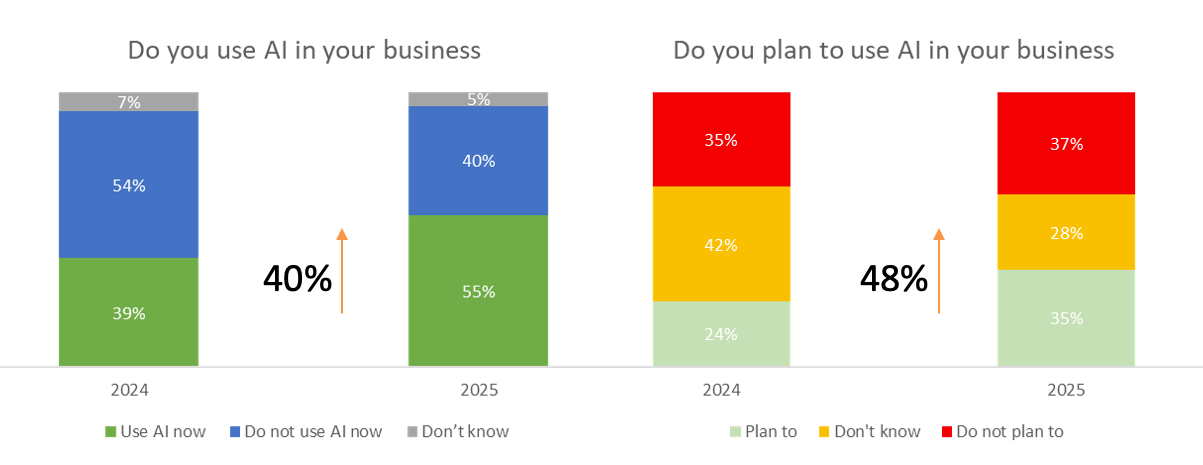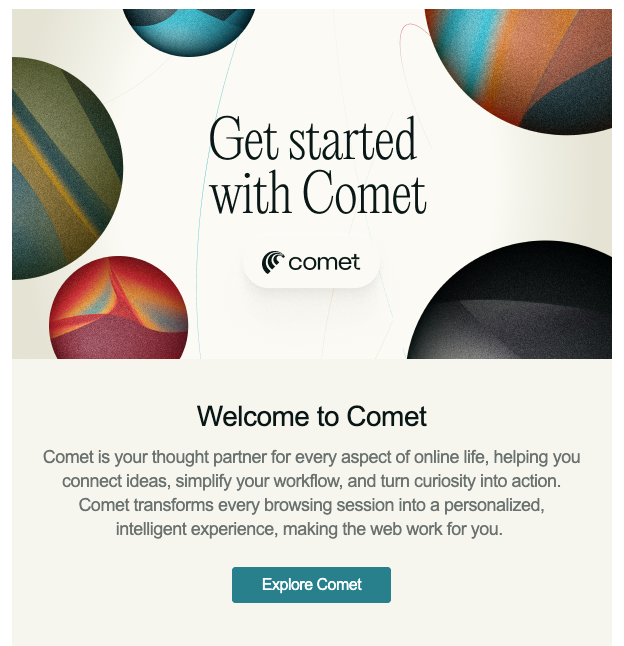Investor Angst, Trust Factor, SMB Adoption, Comet's Struggle, Bad Service

Investor AI Anxiety Grows
There have long been AI haters, skeptics and detractors who think we're in an AI bubble or that AI is radically overhyped. Hundreds of billions have been invested in AI companies, which are spending enormous amounts of money on energy infrastructure, talent wars and data centers. Some even argue that AI investments are propping up the economy and keeping it out of recession. That spending, together with investor expectations of future ROI, have propelled big tech companies to previously unthinkable valuations: Nvidia is worth more than $4 trillion. Now a confluence of developments has rattled Wall Street and raised the specter of an AI bubble bursting. The first was the mixed reception to ChatGPT-5, which suffered from a botched rollout and was not the leap forward many had hoped. It's an incremental improvement at best. (Expectations were perhaps too high.) The second was Sam Altman's casual suggestion that we're in fact in an AI bubble. The third and arguably most significant is a widely covered and perhaps misunderstood study from MIT that asserts 95% of organizations using AI are seeing no ROI. The simultaneity of these developments – together with a Meta AI hiring freeze – has shaken confidence and lent support to the AI bear case.


AI Trust & Skepticism
Is trust in AI increasing or declining? This is one of the questions we're now squarely focused on at Dialog. It's central to ChatGPT growth and retention. Accordingly, we just conducted a flash consumer survey (n=457) looking closely at trust, especially in the context of local search. We'll be publishing those findings soon. Our previous consumer surveys have shown most respondents trust AI as a general matter. In June (n=1,000) we found that 62% trusted AI outputs. The "no" number was <10% and the "sometimes" number was 30%. This most recent survey showed a bigger "sometimes" number but with a smaller sample. And the number of people whose trust in AI had declined over the past 6 months was less than 10%. In other words, there are some mixed messages here. There certainly hasn't been a collapse of trust but there may be some growing uncertainty. Morning Consult says 27% of adults don't trust AI "at all." And Yext's survey data suggest nearly half (48%) of AI users seek out secondary sources to validate AI information. Yet I think the question of AI and trust is fairly nuanced. In some contexts users are going to be more trusting and in others more cautious. Overall, the question of AI trust is fundamental to whether ChatGPT can maintain its current growth curve and whether Google can use trust (e.g., quality of its local data) in the way Apple uses privacy as a marketing tool and competitive differentiator.


Report: SMB AI Usage Jumps
A recent small business survey from Thryv (n=540) found a significant jump among those saying they currently used AI (up 41% YoY) and those who planned to use AI in the future (up 48% YoY). The groups that showed the highest increases were businesses with between 10 and 100 employees and younger business owners. Professional services, restaurants and retail establishments were the verticals most likely to have begun using AI. On the persistent question of AI vs. SMB hiring, there were mixed findings. There was a split among those preferring AI vs. humans: 44% said they couldn't replace employees with AI; the remainder said "possibly" or "yes." And there was a jump among those who said that AI would make their businesses less reliant on humans generally. Nearly 60% of these respondents said they saved 21 hours a week or more from using AI tools. And 63% said they use AI daily. A few of the non-adopter SMBs did not plan to adopt, while others said they were taking a "wait-and-see" approach. In our most recent SMB surveys, Dialog found that SMB AI adoption was basically flat. However we did find similar attitudes toward hiring and personnel. In our most recent survey (Q3), 44% of SMB respondents said they would need to hire fewer people in the future.


Comet Browser's Uphill Battle
I got access to Perplexity's Comet browser this last week. I'm not a "Plex head," but wanted to try Comet for obvious reasons. Comet is built on the same underlying Chromium framework that runs Google's and Microsoft's browsers. That makes switching to Comet easy; you can import all your bookmarks, folders and extensions from Chrome in a click. There's also Gmail and Calendar integration. The browser has a lot of features and many people have given it positive reviews. The marquee features are the assistant sidebar panel and agentic capabilities, meaning it will pursue multi-step actions on your behalf (e.g., buy sports tickets). It's certainly a viable alternative to Chrome or whatever browser you're using. But, aside from early adopters, this 1.0 Comet is unlikely to convert many mainstream users from Chrome. Chrome also offers an AI Assistant (though it's not prominent). And Microsoft Edge now includes Copilot. All browsers will soon be AI-enabled and people will likely default to the browser they're familiar with. To gain adoption, Perplexity needs to aggressively play up its assistant and agentic features and make them genuinely useful. What's clear right now, however, is that when all browsers have AI and "agents," the way people interact with websites will dramatically change.


AI Not Making Customer Service Better
Google is reportedly testing a new AI chatbot for Google Business Profile support. Google's customer support has historically been inadequate at best. If properly trained with accurate information, perhaps this will be an improvement. But the golden promise of customer service improvements via new technologies, including AI most recently, has rarely materialized for consumers. For CS organizations new technologies are largely about saving money rather than providing a better experience. And while AI is dealing successfully with some routine CS inquiries, it's not the magic solution many claim it is. Plenty of data from sources such as Forrester, Cavell, Verint and others, show that perceptions of customer service continue to decline. In one high profile example, Klarna replaced 700 support personnel with AI, only to turn back to humans when the AI solution failed to deliver. (There are other examples of this too.) T-Mobile has done considerable PR around its CS deal with OpenAI. As a customer I can report there's zero evidence of improvement. Technology continues to increase in sophistication but customers mostly aren't benefitting. While the public debate is often about technology capabilities or limitations, the problem is not technology per se but the c-suite's failure to recognize and invest in the strategic value of good service.

Everything Else
- Yes, the Google habit is hard to break, but see shopping.
- Perplexity launches revenue-sharing model for content publishers.
- AI is starting to affect the way we talk (Washington Post).
- Former Google executive: post-graduate degrees may become obsolete.
- Hundreds of thousands of Grok chats indexed by Google.
- Google: Genie 3 a critical step on the path toward AGI.
- Former Google CEO says AI companies too fixated on AGI (NYT).
- AI may in fact turn out to be a "net job destroyer."
- Chatbots pose risks to those with mental health issues and teens.
- Don't call it slop: AI video eating social media (Washington Post).
- Hollywood: AI video is getting more realistic – and controversial.





